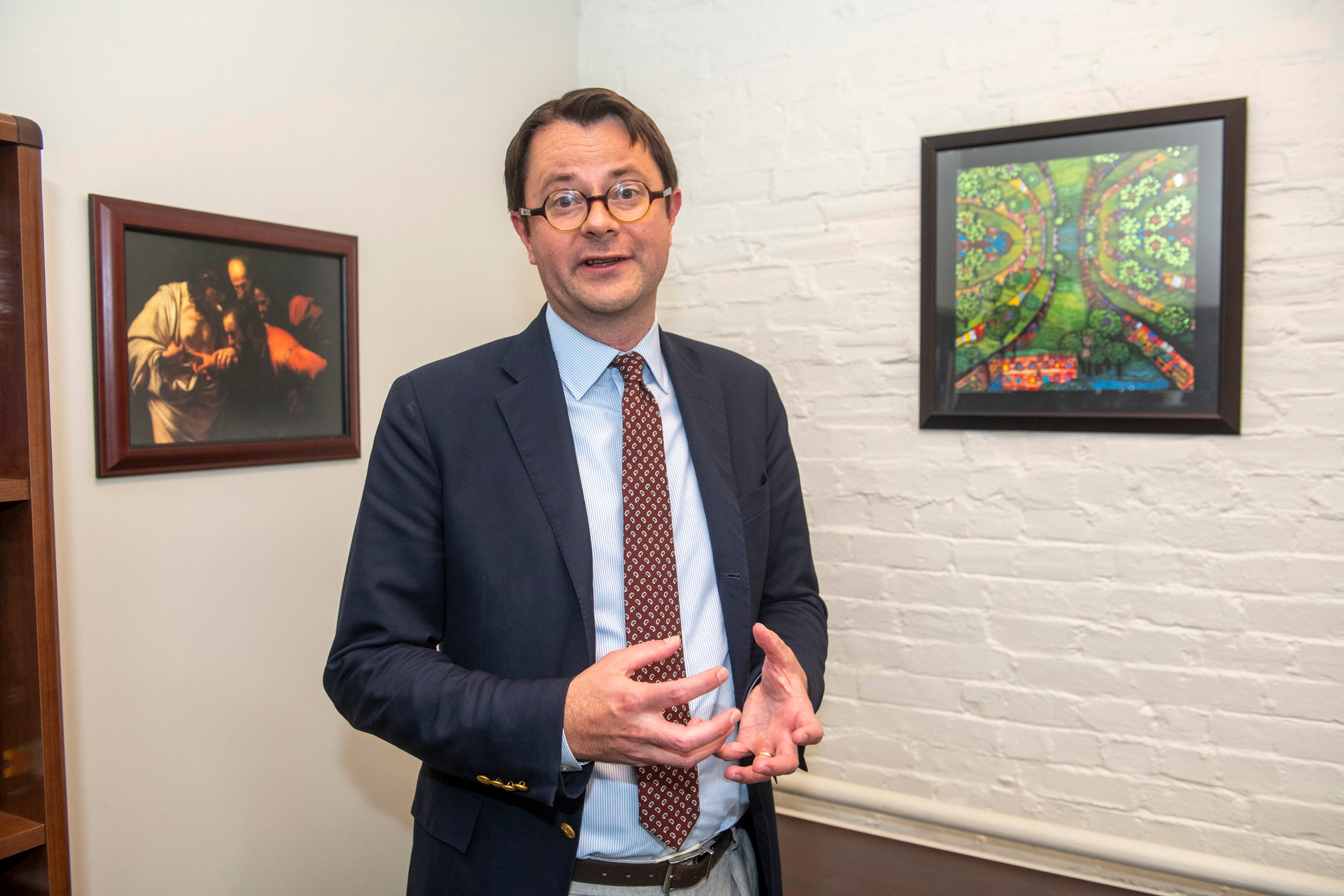
Illustration by Roger Chouinard
New global survey looks at health, well-being
Researchers at Harvard, Baylor launch groundbreaking Global Flourishing Study.
What’s your blood pressure?
For most people, this is an easy question, a fundamental measurement taken at every doctor’s visit. Many supermarkets have free stations to check it. Even smart watches can gather this metric anywhere, anytime.
Now answer this: What’s your purpose in life?
That data, according to a group of researchers at Harvard University and Baylor University, might be just as important as blood pressure in gauging what the scholars view as human well-being. That is to say, the sum total of your physical and mental health, along with your happiness and life satisfaction, sense of meaning and purpose, character and virtue, and close social relationships. This view of overall health is the focus of their new $43.4 million Global Flourishing Study to be launched this month — the largest, most culturally and geographically diverse of its kind. The team will follow roughly 240,000 participants from 22 countries over five years to gather data on which individuals or nations are flourishing and why, or why not.
“Health is more than the absence of disease,” according to the Centers for Disease Control and Prevention . Well-being is harder — but not impossible — to measure. While previous studies have tried, the Global Flourishing Study, whose partners include the survey giant Gallup and the Center for Open Science , is the first to take a global, longitudinal approach in an attempt to find causal links between well-being and specific character traits — like extroversion or optimism — practices, communities, relationships, or religions. If successful, the survey could later be administered as a kind of diagnostic test to prescribe interventions, similar to exercise and heart-healthy diets for cardiovascular disease.
“We study physical health very well,” said the project’s co-director, Tyler VanderWeele, the John L. Loeb and Frances Lehman Loeb Professor of Epidemiology and director of the Human Flourishing Program at Harvard. “We also study income and wealth very well.” But while these are no doubt important, people also care about being happy, having a sense of meaning and purpose, and trying to be a good person. “Why aren’t we studying these topics with the same level of empirical rigor as we study physical health and income?”
One reason is because it’s difficult. Measuring happiness, purpose, or love requires more than a medical instrument. Centuries of philosophical and theological texts offer varying and valuable takes on the meaning of life, which is why VanderWeele enlisted a senior philosopher to help develop the survey questions. The director hopes this modern effort will result in more quantitative, measurable answers to this age-old question.
“What we measure shapes what we talk about, what we focus on, what we aim for, and policies put in place to achieve it,” he said.
GDP might be as ubiquitous a metric as blood pressure, but because a country has a high GDP doesn’t always mean its citizens have a high level of well-being. People in wealthier developed countries, for example, often have higher levels of happiness and life satisfaction. But people in poorer, developing countries typically have a greater sense of meaning and purpose. They also tend to have stronger relationships. “We don’t score very highly on that in the United States,” said VanderWeele.
To study these seemingly nebulous qualities the way scientists study disease, the multidisciplinary team designed a survey in which participants respond to statements like: “I am content with my friendships and relationships,” “I feel that I’m a person of worth,” and “I have forgiven those who hurt me.” There are also more familiar questions like, “How often do you worry about safety, food, or housing?” and “About how many cigarettes do you smoke each day?”
Translating these concepts across cultures has not always been easy. Germany, for example, has two different words for “happiness,” neither of which map exactly to the English definition. Love doesn’t have one universal definition, either: There’s romantic love; love between parent and child; love of country; and spiritual love. And in some countries where humility and privacy are highly valued, said Matthew Lee, a lecturer of sociology and the director of empirical research for the Human Flourishing Program, individuals might tailor responses to avoid seeming boastful about how they’re doing or attention-seeking if they are having difficulties.
“So how do we incorporate all of that into one study?” Lee said. “The answer is we don’t. But we can become more aware of the limitations of what we’re trying to do.”
In an attempt to head off problems, the research team solicited feedback from scholars around the world and ran cognitive interviews and pilot tests to learn whether respondents in various countries interpreted the questions differently. Now, after three years, the first survey is finally set for launch, and the data will be open-access and available to anyone.
Some critics still have doubts about whether the study can effectively measure seemingly more subjective qualities, like love.
“To that, I would say, ‘Let’s see what we get,’” said Lee. “Happiness keeps going down, especially in the United States. If we’re not prioritizing deep, fulfilling, loving relationships, then [at least] our salaries can go up. And we can have bigger houses.”
But does that mean we have meaning in life? As Lee suggested, we’ll find out.


